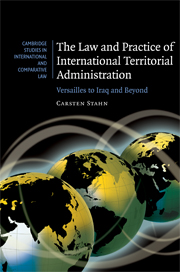Book contents
- Frontmatter
- Contents
- Foreword
- Preface
- Selected table of cases
- List of abbreviations
- Table of engagements
- Introduction
- Part I The historical and social context of international territorial administration
- Part II The practice of international territorial administration: a retrospective
- Part III The foundations of international territorial administration
- Introduction
- 11 The legality of international territorial administration
- 12 The legitimacy of international territorial authority
- Part IV A typology of legal problems arising within the context of international territorial administration
- Part V International territorial administration at the verge of the twenty-first century: achievements, challenges and lessons learned
- Bibliography
- Index
- CAMBRIDGE STUDIES IN INTERNATIONAL AND COMPARATIVE LAW
11 - The legality of international territorial administration
Published online by Cambridge University Press: 19 January 2010
- Frontmatter
- Contents
- Foreword
- Preface
- Selected table of cases
- List of abbreviations
- Table of engagements
- Introduction
- Part I The historical and social context of international territorial administration
- Part II The practice of international territorial administration: a retrospective
- Part III The foundations of international territorial administration
- Introduction
- 11 The legality of international territorial administration
- 12 The legitimacy of international territorial authority
- Part IV A typology of legal problems arising within the context of international territorial administration
- Part V International territorial administration at the verge of the twenty-first century: achievements, challenges and lessons learned
- Bibliography
- Index
- CAMBRIDGE STUDIES IN INTERNATIONAL AND COMPARATIVE LAW
Summary
The UN Charter does not expressly provide for the conduct of the UN in an executive capacity such as territorial administration outside the framework of the Trusteeship system. Nevertheless, three factors support the claim that the United Nations has statutory authority to administer territories beyond the scope of application of Article 81: the drafting history of the Charter, the institutional practice of the organisation, and the systemic structure of the Charter system.
Authority to administer territories under the Charter of the United Nations
The debates at the San Francisco Conference lend support to the view that the UN was intended to possess sufficient personality to exercise jurisdiction and control over territory.
The drafting history of the UN Charter
Following the practice of the League of Nations in territorial administration, the drafters of the Charter deliberated in 1945 whether it was necessary to bestow the organisation with the express power to exercise territorial jurisdiction or to guarantee the territorial integrity of an entity. The Norwegian delegation introduced a proposal expressly to state that the Security Council may “take over on behalf of the Organisation the administration of any territory of which the continued administration by the state in possession is found to constitute a threat to the peace”. This proposal was only withdrawn because it was assumed that such a reference could limit the discretion and field of application of measures at the disposition of the Council under Chapter VII.
- Type
- Chapter
- Information
- The Law and Practice of International Territorial AdministrationVersailles to Iraq and Beyond, pp. 415 - 516Publisher: Cambridge University PressPrint publication year: 2008



